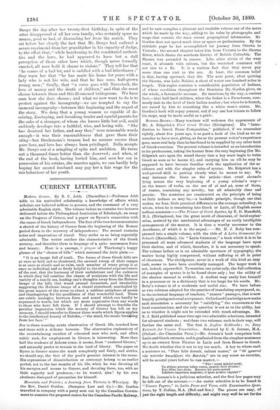CURRENT LITERATURE.
Modern Greece. By R. C. Jebb. (Macmillan.)—Professor Jebb adds to his unrivalled scholarship a knowledge of affairs which scholars are believed seldom to possess, and the command of a very admirable English style. The volume before us contains two lectures delivered before the Philosophical Institution of Edinburgh, an essay on the Progress of Greece, and a paper on Byron's connection with the cause of Greek Independence. The first of the two lectures contains a sketch of the history of Greece from the beginning of the Roman period down to the recovery of independence. • The second contains notes and impressions of travel. They strike us as being especially admirable. The writer catches the characteristics of the Greek scenery, and describes them in language of a quite uncommon force and beauty. Here is a passage, a propos of Thackeray's happy phrase of the "chorus of hills" which surround the Attic plain :— "It is an image full of truth. The forms of these Greek hills are at once so bold and so chastened, the onward sweep of their ranges is at once so elastic and so calm, each member of every group is at once so individual and so finely helpful to the ethereal expressiveness of the rest, that the harmony of their undulations and the cadences in which they fall combine the charm of sculpture with the life and variety of a sun-lit sea, leading one's thoughts away from the Hebrew image of the hills that stand around Jerusalem, and irresistibly suggesting the Hellenic image of a choral sisterhood, marshalled by the great master of the scene to chant a sublime antiphone of praise and thanksgiving for the goodliness of that wonderful land. There are subtle analogies between form and sound which can hardly be expressed in words, but which are more expressive than any words to those who have felt them. If I should attempt to describe the peculiar impression which the scenery of Greece has left on my memory, I should transfer to Greece those words which Byron applies to the intellectual beauty of Zuleika,—' the mind, the music breathing from her face.'"
Nor is there wanting acute observation of Greek life, touched here and there with a delicate humour. The observation explanatory of the overwhelming number of educated men who seek, and often vainly seek, for employment in Greece, is interesting. More than half the students of Athens come, it seems, from "enslaved Greece," and naturally prefer to remain in the land of liberty. The paper on Byron in Greece states the truth completely and fairly, and settles, we should say, the fact of the poet's genuine interest in the cause. His expressions of dissatisfaction or contempt belong to an earlier period, not to the last months of his life, when he was devoting all his energies and means to Greece, and devoting them, too, with no little sagacity and prudence,—to be wasted, alas ! by his own obstinate disregard of precaution for himself.






































 Previous page
Previous page